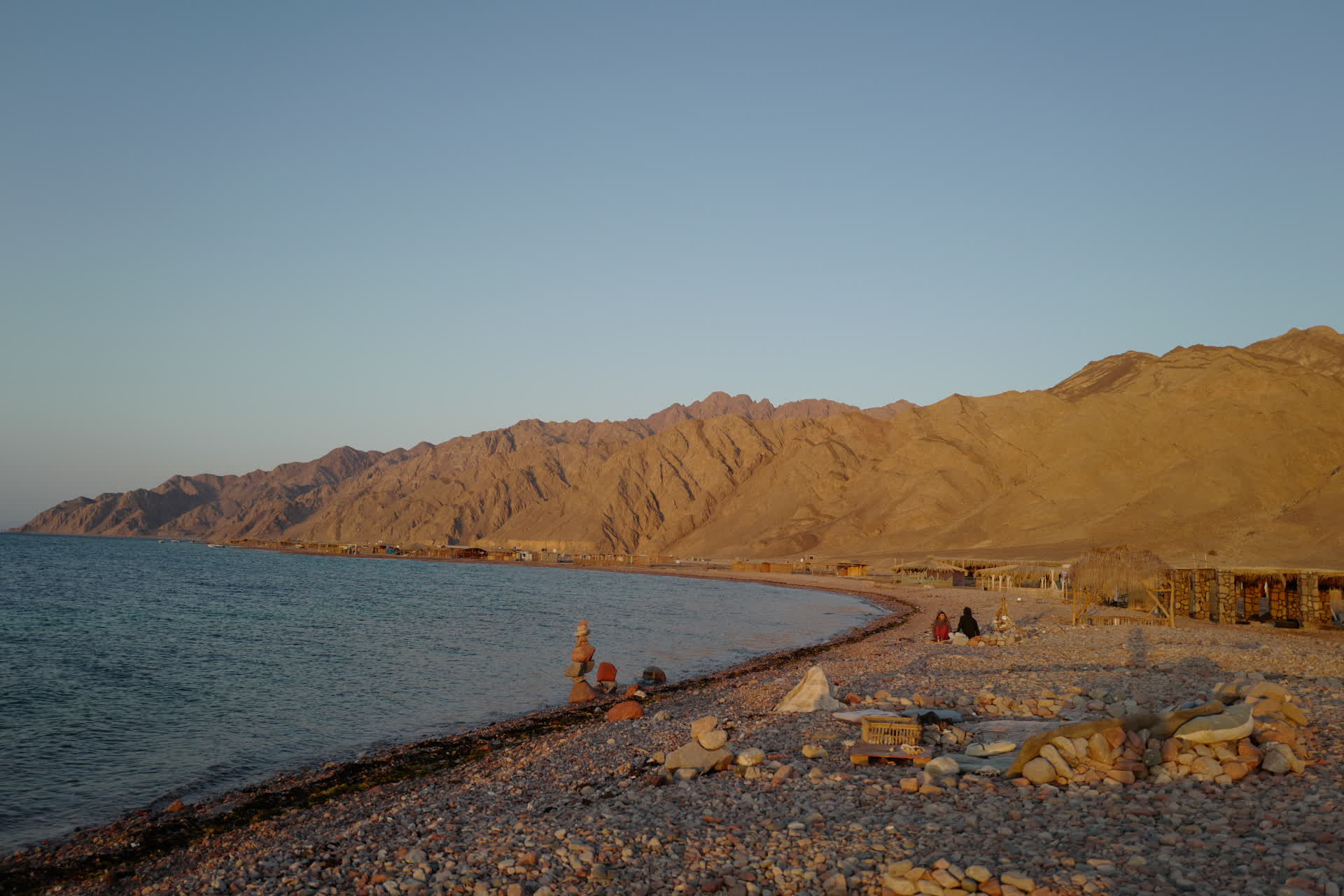North of Dahab lies the Blue Hole, and further north is Abu Galum. There are a few ways to get there: you can take a boat directly from Dahab, or you can go to the Blue Hole first and then continue by boat or on foot.
This trip was planned entirely by my girlfriend’s friend; we just had to follow her. Hearing that the place was quite remote and supplies were scarce, we packed our bags the night before with just the essentials. The next morning, we took a taxi together to the port, where quite a few boats were already docked. It was less a port and more a small beach, situated next to some ruin-like buildings. The boats were small and haphazardly scattered along the shore, with no sense of order. The distant sea and the rising sun cast a filter over the harbor, making it just about presentable.
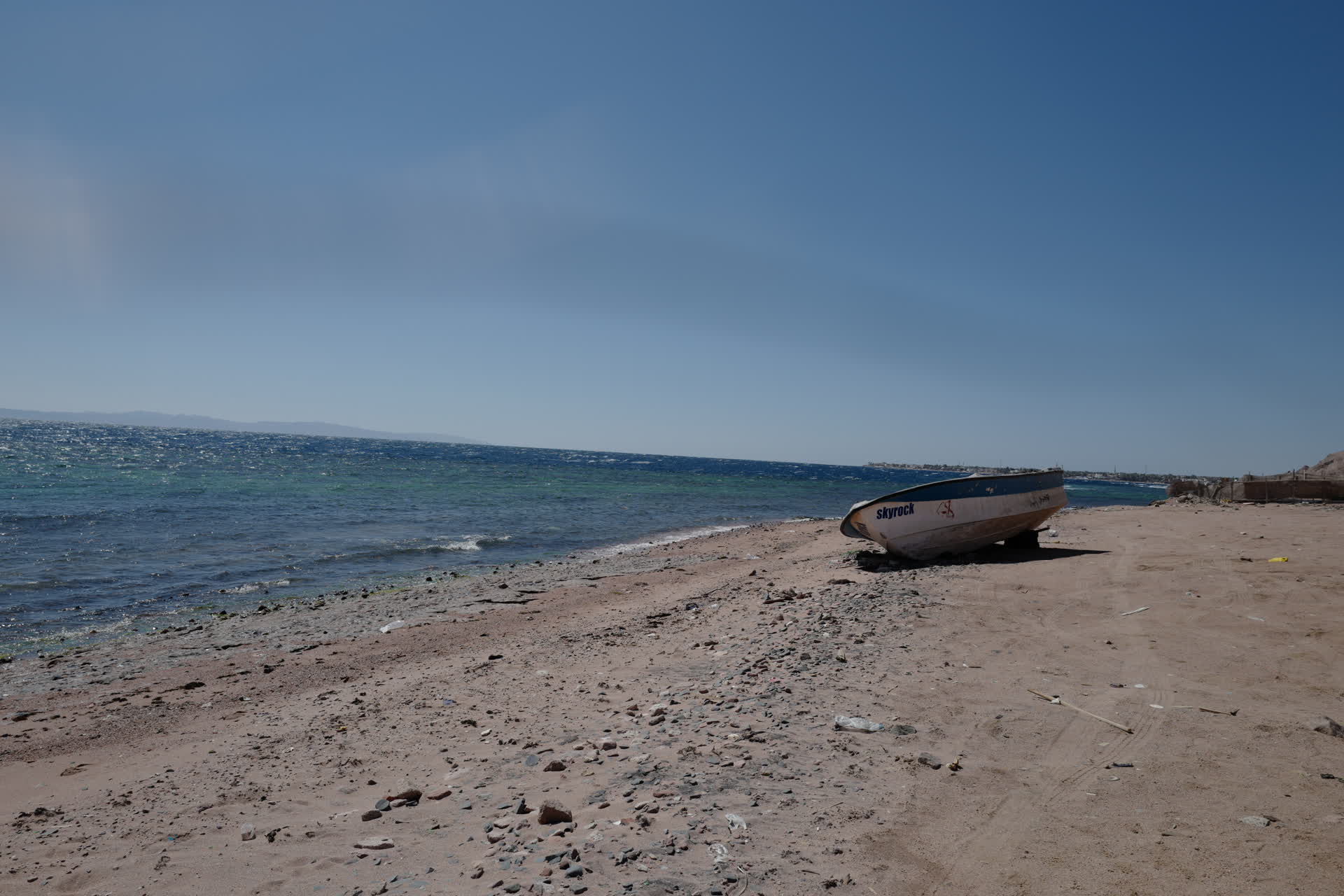
A number of people stood on the shore, gathered in a cluster, their luggage and supplies spread out at their feet. I stole a glance and saw that besides the basic water and gas canisters, there were also plenty of fresh fruits and vegetables. Seeing this, I could guess just how scarce resources must be at our destination. My girlfriend’s extremely extroverted friend went up to greet them and introduced us. It turned out that one of them, an Egyptian man, was the owner of the lodge we were heading to. The others were either his friends or fellow guests.
The owner wasn’t tall, and while not burly, he was solidly built. He was dressed comfortably and casually, looking less like a boss and more like someone randomly pulled off the street. But I heard he was a major landlord with multiple properties in the area and a thriving business. While listening to their idle chatter, I looked around. Several locals, mostly children, were scattered on the beach, chattering in Arabic. They wore faded white robes, and I couldn’t guess what they were doing there at that time.
After waiting for about half an hour, we saw them start to load things onto the boats and knew it was time to depart. With no dock, the boats were beached on the sand, so getting on was like climbing a wall: you had to heave your things aboard first, then use your hands to hoist yourself up, pushing off with your rear to get over the side. Those with a smaller build even needed a helping hand.
Besides us passengers, there were two locals in white robes on the boat: an older man and a boy. I figured the older man would be steering, but to my surprise, when the boat started, it was the boy at the helm. He looked to be no more than a teenager, probably of elementary or middle school age. He barely spoke a word the entire time; it was the older man who would occasionally call out instructions.
The boat finally set off. The Red Sea was not calm; the after-effects of a huge storm from a few days prior still lingered. This translated into violent and unpredictable lurches on the boat. As our small vessel cut through the Red Sea, I briefly felt like a carefree pirate. But then a huge wave crashed over us, making my butt ache from the impact and splashing salty water all over my face and glasses, snapping me back to reality. I was no pirate, just a helpless, ordinary person trembling on a strange sea. The only other time I’d felt a similar jarring motion was at an amusement park, but this was the most basic version—no safety measures, the only things keeping you alive were this one boat, and a child.
We headed north, passing the Blue Hole and encountering boats on their return journey. Whenever two boats crossed paths, many people would stand and raise a hand in a gesture of salute, which had an air of solemnity and mystery. After about 30 to 40 minutes on the vast Red Sea, we finally reached Abu Galum.
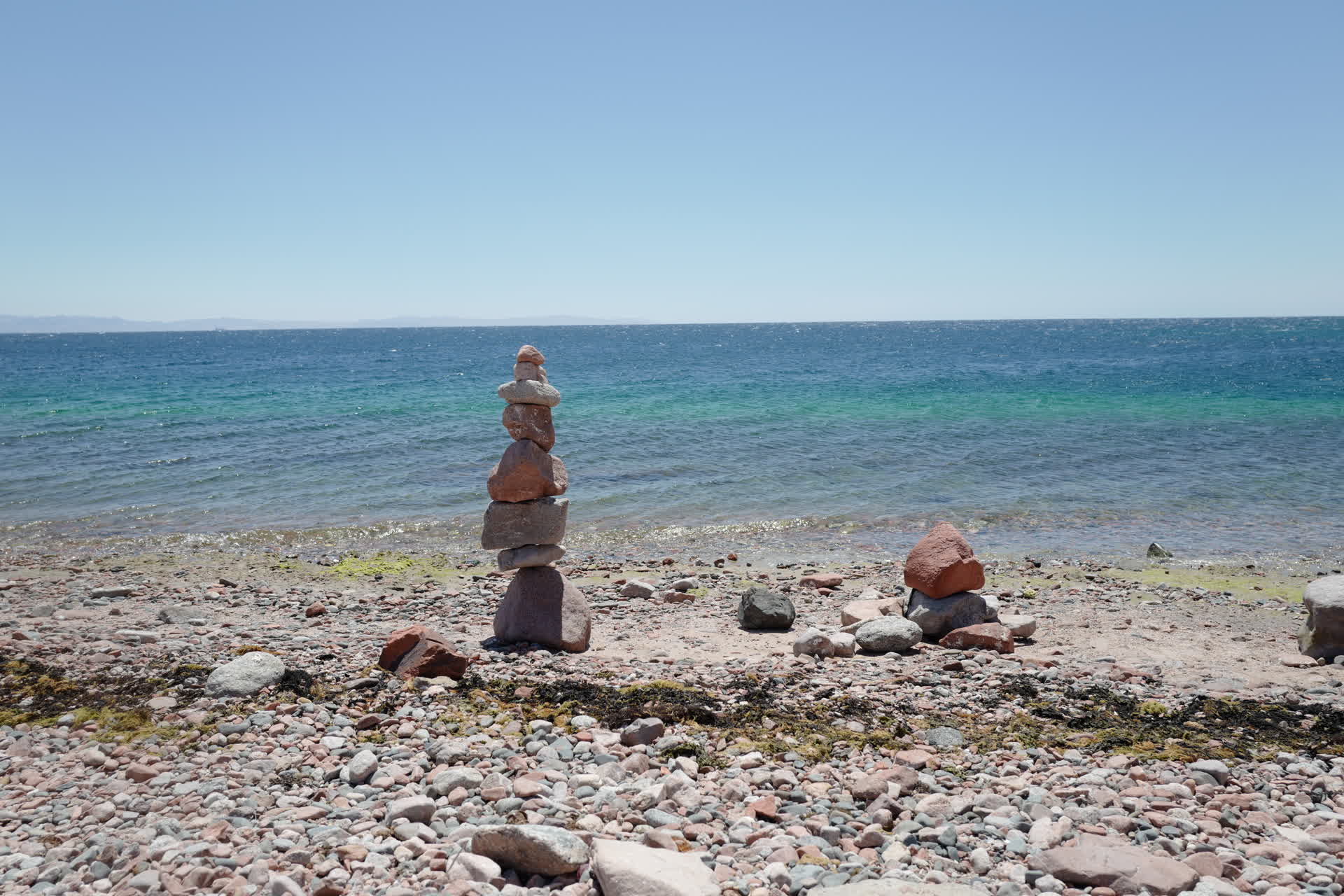
Stepping off the boat, our feet landed on a pebble beach. Carefully stacked stones nearby marked the docking spot. This was a vast coastal plain. North of Dahab, the mountains meet the sea, and any paths are only wide enough for hiking. Thus, Abu Galum, as the first plain we encountered, felt exceptionally precious. Looking around, all we could see were huts of various sizes—the only shelters available for human existence. The huts were backed by towering mountains and rocks, and though they faced the sea, the scene was far from idyllic.
This land was filled with a raw, immense energy that would crush any delicate, refined imagery or fantasy.
We walked into a large hut that served as the “reception,” and an incredible feeling flooded my brain: that a scene like this could actually exist. It was like stepping into a surreal play, but this play was real, and my eyes struggled to adjust. The roof was woven from large leaves and branches, supported by a thick wooden pillar worn smooth to the touch. Carpets were laid out layer upon layer on the ground, with a patch of earth left bare in the middle where a huge aloe vera plant grew. The space was filled with many small decorative objects—exquisite, creative, and natural, true handmade crafts. The main hall had hammocks, musical instruments, books, and a chessboard, but not a single piece of high-tech equipment in sight.
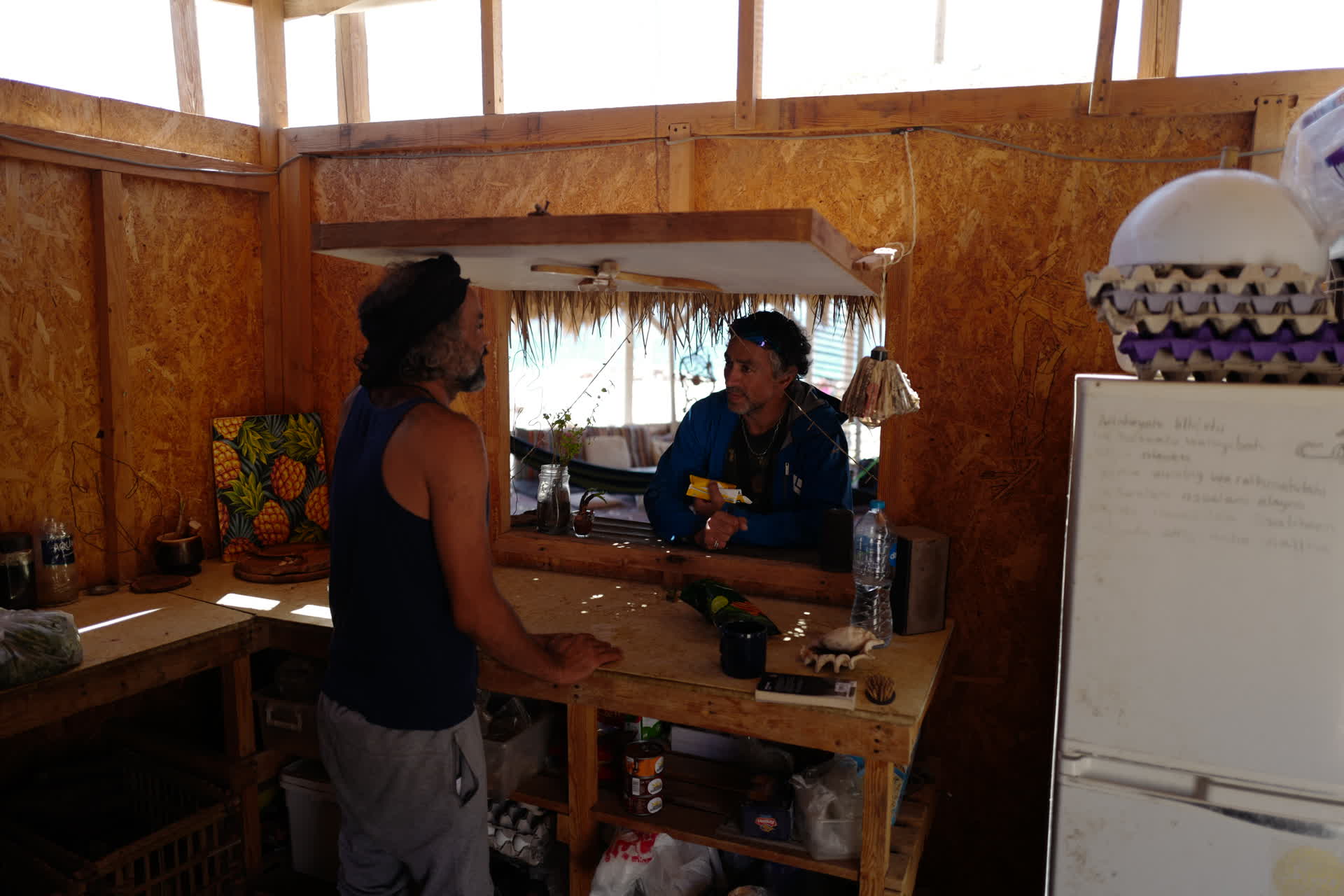
Behind the reception was the kitchen, filled with jars and bottles containing unknown spices and herbs. If you wanted tea, you could go to the kitchen anytime to boil water and brew it yourself. Most of the objects, though old, were still functional. I vividly remember a dented iron kettle with a crooked handle and a lid that wouldn’t close properly. Yet, people used this very kettle day after day to boil water for tea.
Our huts were scattered nearby. Their roofs and walls were also woven from grass and wood, offering just enough shelter from the sun and wind. Inside, a mattress lay on the floor, and that was it. The nearby toilet was small, and showering was a luxury, as fresh water was extremely limited. All the water was stored in huge white barrels, which were replaced periodically by someone who drove in. Being in the desert, the simple conditions were completely understandable; or rather, they were a rare treasure, for such an atmosphere is not something you can find just anywhere.
Besides the know-it-all owner, a few other people left a deep impression on me. One was a French woman who had been living there for a while. She was tall and slender and often wore a long white dress. One evening, I saw her walking down from the mountain, her dress billowing in the wind, looking ethereal. She also sang; her voice was a bit raspy but full of character. Another was the camp’s manager. He was even thinner, with a large beard and a huge turban wrapped around his head, and he never wore shoes. I could feel that he was incredibly close to nature, almost one with it. He knew the natural lore of this land, could identify medicinal herbs, and knew how to cook. He played instruments and chanted poetry, like a conduit for nature in the human world.
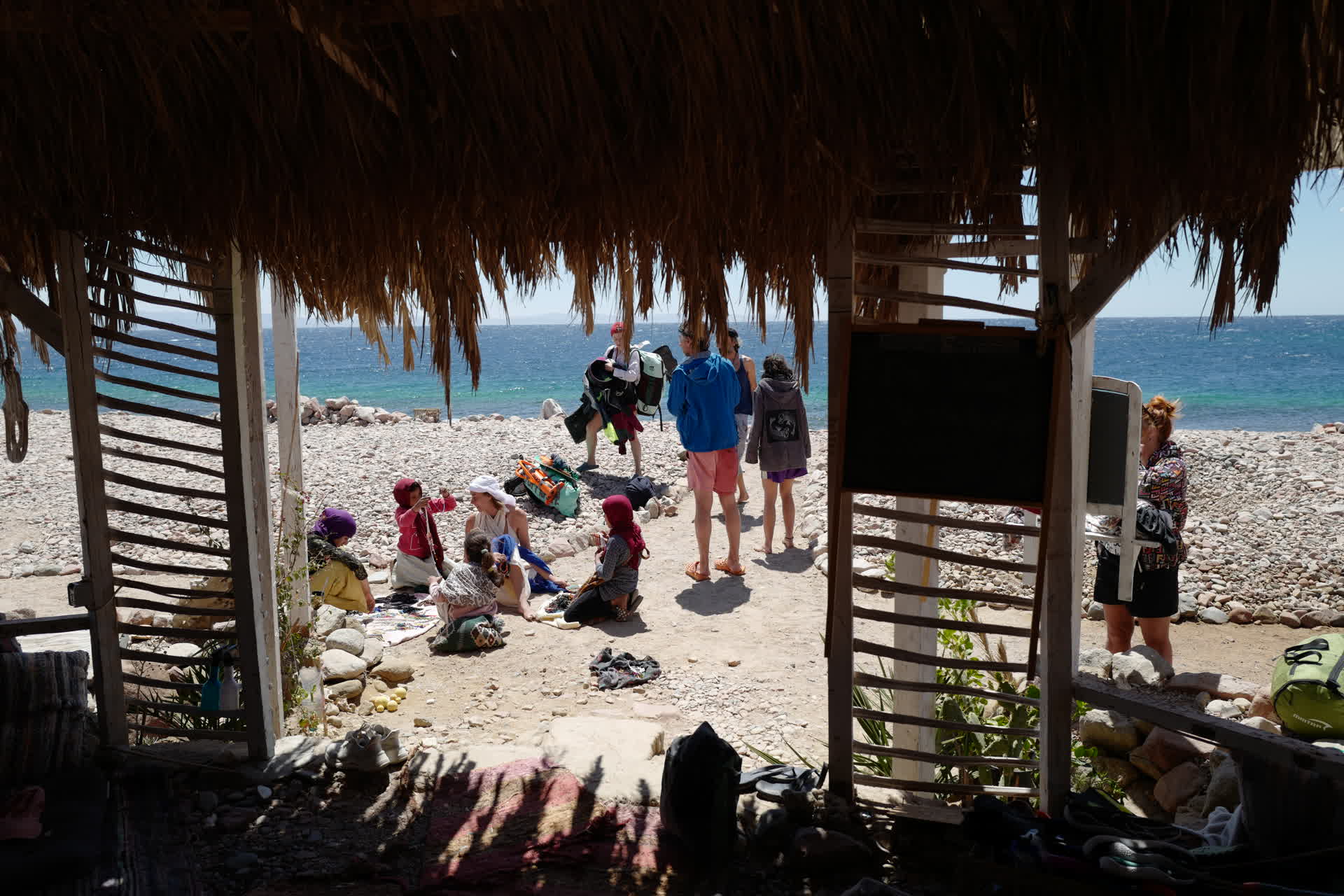
There was almost no passive entertainment here to kill time. If you wanted to have fun, you had to be proactive and create it yourself. You could either let your imagination run wild playing with stones, or pick up a guitar and try to pluck out a few notes, or grab a book filled with religious tales. For those who don’t know how to pass the time, the sense of boredom would be magnified. But for those who know how to feel and create, it was like being a fish in water.
When we had nothing to do, we would chat with the other people. A couple from the UK struck up a conversation with us, curious about the Kindle in my hand. He was a music and dance curator, here to seek inspiration. His wife, however, didn’t seem to like the place very much; we would even occasionally hear them arguing. There was also a mother and daughter from Ukraine. In the evening, I sat with them and a few young people from Cairo around a fire we had built on the pebble beach. We gathered the scarce surrounding weeds and branches to feed the flickering flames, listening to them share all kinds of experiences and stories.
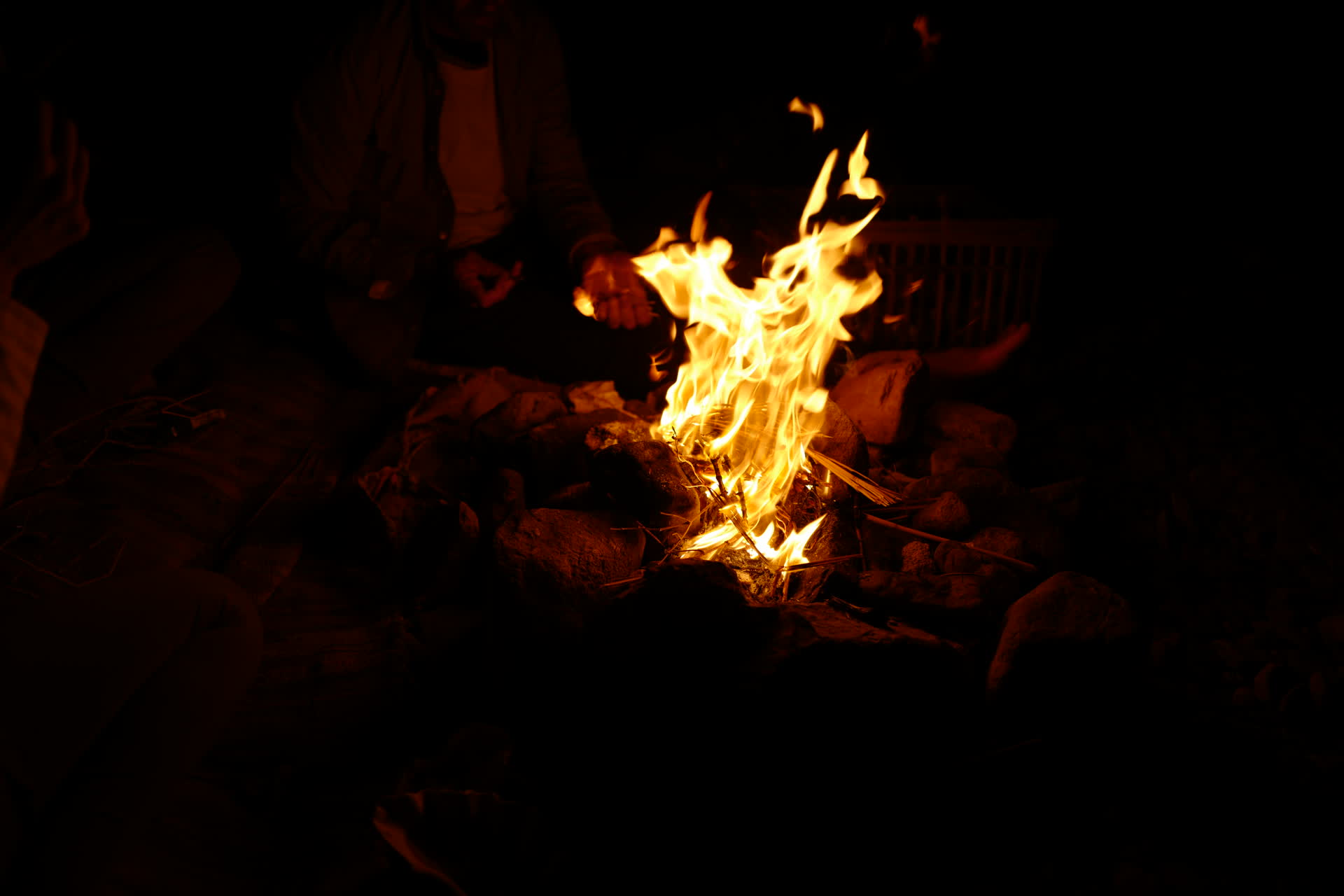
The arrival of night was full of drama.
First, we heard someone shout. Following the direction they were pointing, we looked toward the distant mountains and saw a giant moon slowly emerging from behind them. It was close to a full moon, a nearly perfect circle, its width spanning several mountain peaks. It rose from behind the mountains at a speed visible to the naked eye. Though the light wasn’t blinding, the craters on its surface were clearly visible. A hazy twilight hue enveloped the moon, making it look like a black hole with immense gravity, constantly pulling at our gaze and stirring our senses. The moon was the protagonist, the sky its backdrop, changing color from a soft orange-red to a deep black as the star of the show moved. Night was the inverse of day, and the moon was like a giant incandescent bulb hanging high in the sky.
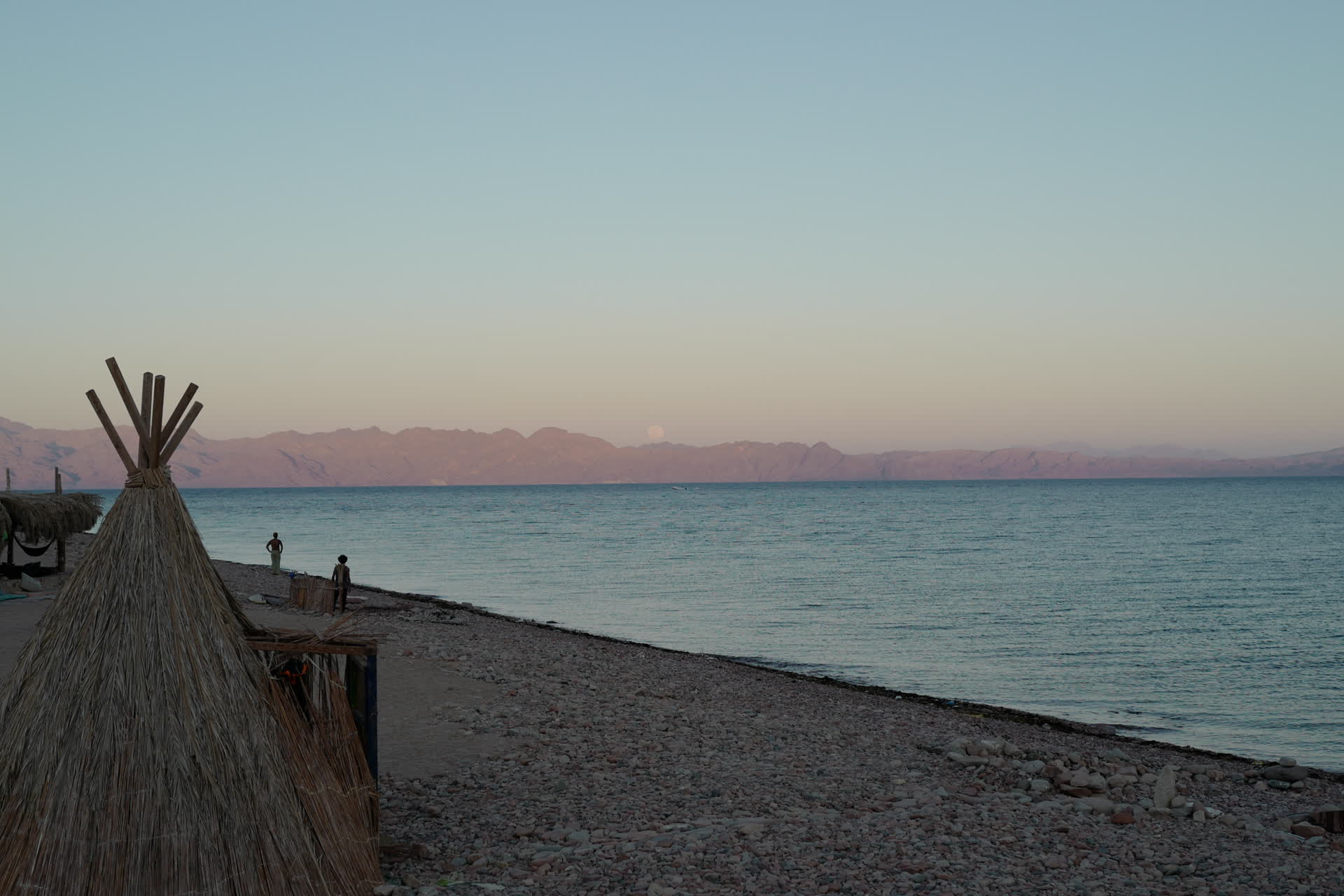
Silvery moonlight spilled over the Red Sea, the land, and the mountains. Infected by the atmosphere, people grew quiet, no longer speaking loudly. After their evening tea, they sat or lay scattered about. The manager took out a nearby guitar and began to play and sing. Those who could sing joined the melody, while those who couldn’t quietly tapped out the rhythm. The gentle sea breeze blew in gusts, as if keeping time for us. Music and laughter drifted from the hut, melting into the bright moonlight and the tender night.
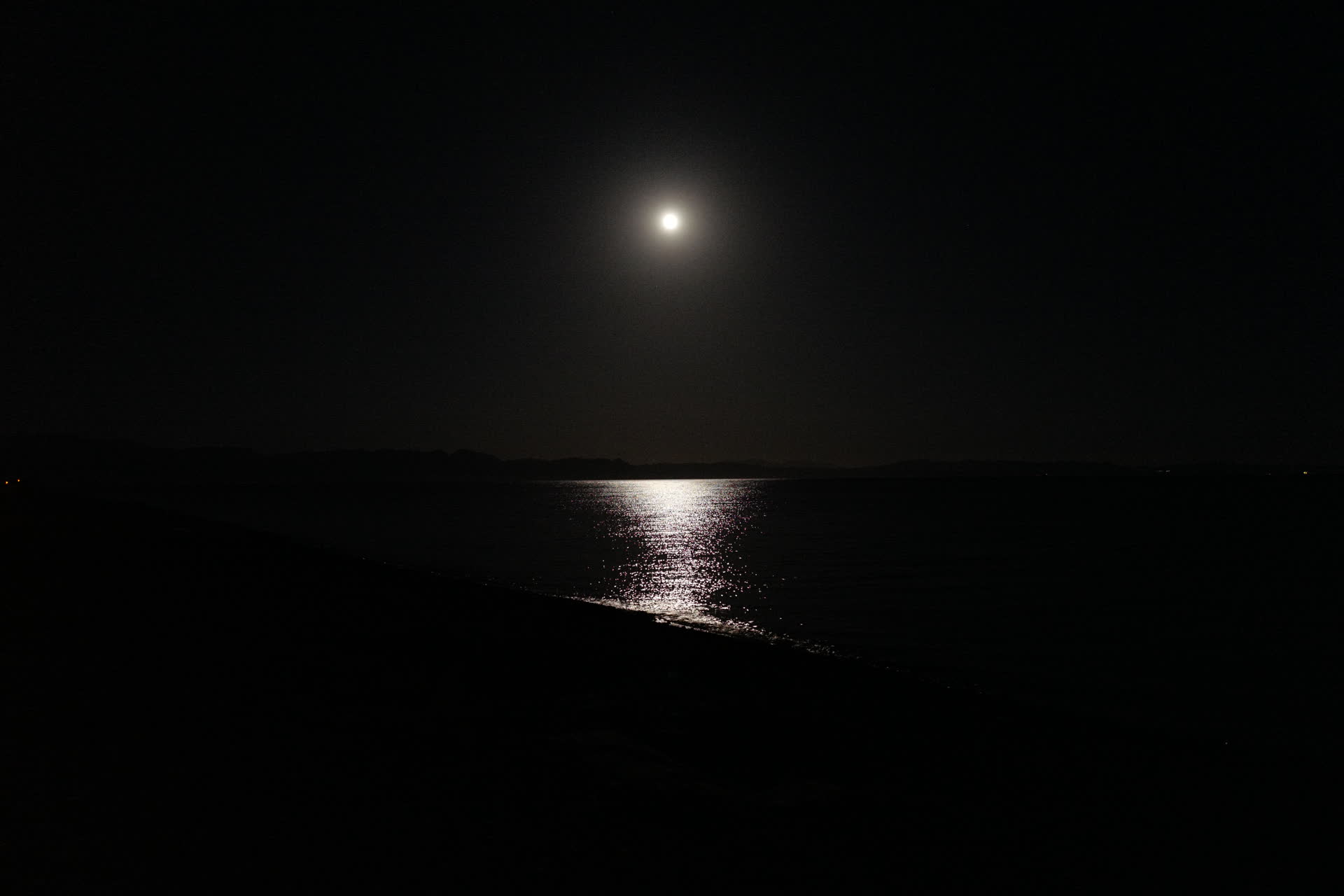
The deep night passed in a flash. The sun prepared to rise, beginning the next cycle.
The immense energy of Abu Galum seemed to affect everyone who came. My girlfriend’s cold symptoms actually worsened here, while my emotions, on the other hand, churned and surged dramatically. It felt unusual; we were still on Earth, after all, but this place felt as if it were exposed to some strange radiation. Once a person steps in, they are bound to be affected. It was all so mysterious.
